Peter Case is kind of hard to categorize. For the last 30 years he has primarily been an acclaimed solo artist in the Americana vein, but with a bit more bite than you might expect from that description. That bite probably comes from his earlier musical adventures as a founding member of the short-lived power pop band The Nerves, which toured with The Ramones, and The Plimsouls, whose best-known song “A Million Miles Away” was on the soundtrack to Valley Girl. But however you want to categorize him, he’s been writing great songs for 40-odd years.
This interview was for a preview article for noozhawk.com for Case’s 9/21/16 concert at the Maverick Saloon in Santa Ynez, California, as part of the Tales from the Tavern concert series. It was done by phone on 9/1/16. (Greg Allen photo)
Jeff Moehlis: I know that you’ve played at Tales from the Tavern before. What do you find special about that performance series?
Peter Case: I like that series a lot. It’s been a lot of fun playing it in the past. I haven’t done it for a couple of years, but I really enjoyed it every time. It’s a great audience. I love the thing they’ve forged up there. They’ve sort of educated an audience, and created a really nice environment for this kind of music. It’s a real great ambiance, and a great place to see a show.
JM: What can people look forward to at your performance?
PC: I’m going to be playing songs from all different parts of my career. I go back from the beginning to the most recent things. Besides being sort of a singer/songwriter show, it’s also really like a musical thing. My heroes in music have been people that really brought a lot to acoustic music, like a lot of the old blues players. I don’t play a whole lot of blues, but I definitely grew up playing that. So I bring a lot of that kind of intensity – not just intensity, but dynamics to the show. It’s an entertaining thing, and I think that people dig it. It goes through a whole lot of different kinds of music. It’s melodic as well as storytelling. I think people will enjoy it.
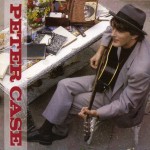
JM: I’m sure you’re aware that this year marks the 30th anniversary of your first solo album.
PC: Yeah – it’s being rereleased, actually, at the end of September. It’s being released with 7 new tracks on Omnivore Records. I just a copy of that.
JM: Cool! So, looking back through a lens of 30 years, what are your reflections on that particular album?
PC: It was sort of a vision I had as I was in the middle of The Plimsouls, that I wanted to do this other kind of writing. I was kind of picking up where I’d left off when I started playing in rock ‘n’ roll bands, which I did for about 10 or 11 years. But that record was me putting everything I loved and sort of imagined into my music. It was a big period of growth, a really big period of exploration and growth in my songwriting. It was a really exciting period.
I got to work with Van Dyke Parks and T-Bone Burnett and a number of other great musicians. Van Dyke Parks – he was a really big inspiration at that point to me. I worked with Roger McGuinn on that record – that was really exciting.
So it was a very exciting thing, and it was a big period of growth. It was sort of the basis for everything that was going to come, to follow that, in a way, for me since then. I think I was the first person from my generation… I was out there on tour with The Ramones in ’77, a part of the punk generation. I was little ahead of the punk generation, with The Nerves, you know? I think I was the first person from that age group to bring back the idea of being a singer/songwriter, to go out and tour like that as a solo singer/songwriter. It was a thing that caught on with a lot of people. It sort of gave people an idea that they could do a new kind of music. So I felt like I was part of a cultural change there.
JM: You mentioned Van Dyke Parks. What was it like working with him?
PC: Oh, well he’s a genius. It was brilliant. I had this song called “Small Town Spree”, and he wrote a string quartet for it. It was so much fun, man. It was very beautiful what he did, and then I got to play a harmonica solo in front of a string quartet. It was so much fun, man, working with all these people. And he’s really funny. You’ve talked to him, so you know what he’s like. He’s a great guy – really brilliant.
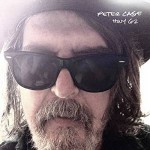
JM: To connect with the present, how did your approach to that first solo album differ from your approach to your latest album, HWY 62?
PC: Oh man, I mean I’ve learned so much between now and then. That was like a first exploration, that first solo record. I mean, every album’s an adventure, and I don’t really think I have it down so every time I make a record I sort of invent a new way to make a record. On this one, we were working with Ben Harper, and the songs are really about America now up and down HWY 62, which is a road that stretches from Mexico to Canada, and I grew up one block off of it. It’s a road that goes through Buddy Holly’s hometown, and The Everly Brothers’ hometown, and Levon Helms’ hometown, and Phil Ochs’. It goes through my hometown, just by coincidence. It kind of gives a slice of two-lane America, you know, not like the big, expensive superhighway America, more like the small towns. And also big cities, but more of an offbeat approach to it.
You know, it’s different, this record. I still have the same standards, in terms of trying to make every song great on an album. I really believe in songwriting, and so I’m trying to make every song be great. I’m trying not to do any filler. Every word is important in a song, and I write like that, trying to make the whole thing happen. I don’t just put records out on a yearly basis. I try to wait until I’ve really got a record that is worth listening to all the way through.
These songs on the new record are based on different things going on in America. There’s songs about the justice system, there’s songs about musicians trying to cope with the music business, a song called “New Mexico”. There’s a song about evictions, and there’s a song about a guy waiting on a plane at a 2016 airport. It’s all different things, but it’s a picture of now. I’m trying to make it as dynamic as possible.
How’s it different? I produced it. I totally took control of this record and produced it myself, with Sheldon Gomberg. I’ve got a nice team of people that I work with now – we sort of understand each other. It’s a little different working as your own producer. But it’s different every record. It’s hard to describe. Some records I write on a typewriter, some I stay up in the middle of the night and write real quietly in the middle of the night so I don’t wake anybody up. That’s kind of what this record was. It’s rockin’ stuff, but you write it in this imaginative realm, and then perform it. A lot of the stuff on the record is first takes, it’s very raw and kind of rockin’. Ben Harper being on board was a big change, because he’s just so enthusiastic. He was a great guy to have involved, and he stayed for pretty much the whole record. Ben was a very big element of this record.
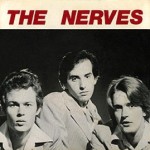
JM: Speaking of anniversaries, it’s also the 40th anniversary of The Nerves EP.
PC: It is? Wow, that’s right.
JM: Can you tell me a bit about what the music scene was like at that time, and how The Nerves fit into that?
PC: Well, The Nerves started in San Francisco in the mid-70’s, and we recorded that record and it came out in the summer of ’76, you’re right. That’s pretty far out. The same way I was sort of ahead of the acoustic movement, at that point we were sort of ahead of the punk rock… The Nerves were a very stripped-down vision of rock ‘n’ roll. We hadn’t heard The Ramones yet, but we played a very stripped-down version of pop songs, rock ‘n’ roll with as a melodic and driving kind of music.
We played up here, and then on the very first day of 1977, we got played up here on the radio on KSAN, and then we drove down to L.A. and moved in down there. There really was nowhere to play. We couldn’t get booked down there. We discovered a few bands like The Germs and The Weirdos, and we put them on. We had a little bit of money left over from some gigs we’d done up here, so we rented a hall and put on The Germs and The Weirdos and The Zeros – everybody’s first gig, you know? We did that all with everybody.
Then we went out and toured with The Ramones, as an opening act. We played all around the United States with Devo, and different people who hadn’t even made it yet. We were just playing. We were at the very front of that whole movement. It was very exciting, and really a lot of fun. That was really, for me, sort of like my Merchant Marine experience, just going out on the road for the first time, driving long distances and hooking up with all these different musicians. It was my very first experience with the music business, so it was really exciting and fun.
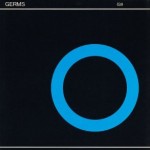
JM: What do you remember about The Germs’ first show? Was it as crazy as I might imagine?
PC: Oh yeah, it was totally crazy. I used to talk to Darby [Crash], who used to call himself Bobby Pyn. I used to talk to him on the phone a lot, and talk to him at the gigs and stuff. I liked him a lot, actually. You read these books about him now… I don’t remember him really like the way these books have been telling it. I suppose he was like that, but around me he wasn’t. We talked a lot. He really wanted to make it in music, and they came out and they wrecked all their equipment, and covered each other with peanut butter or whatever. It was pretty nuts. The one guy who ended up playing with Nirvana [Pat Smear], he was really good. The others didn’t seem like they could really play [laughs]. It was exciting. It was really different.
JM: Any stories you’re willing to share from touring with The Ramones?
PC: I don’t remember how many gigs we did with The Ramones, probably only like 5 or 6. We played in the Chicago area with them, and then we played in Texas with them. It was their first trip to Texas. We played Randy’s Rodeo Hall – before The Sex Pistols played there, The Ramones and The Nerves played there. That was pretty intense. People were trying to hit us with brooms while we were playing, I remember that. It was kind of violent.
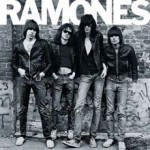
But The Ramones were really fun to play with. I really hit it off with Dee Dee Ramone. I would talk to him a lot. We were both the bass players in the bands. I remember one night we were sitting in a Denny’s down near Houston, and Dee Dee goes, “I named the band. It was my idea to call them The Ramones.” And then he said, “I wrote all the songs.” I’m like, “Is this guy for real, man? Claiming he wrote all the songs, named the band and all that?” And it was true. You find out later that it was all true. He was the guy I connected with the most in The Ramones.
JM: If I’m not mistaken, at that time The Ramones were actually getting along with each other.
PC: It was before the problems settled in, and Tommy was still in the band. I liked Tommy a lot, too. The other guys were a little harder to get to know, but I could talk to them. Tommy, I ended up connecting with years later. You know, I look a lot different than I did, and I walked into a room and Tommy’s sitting there, and he looks up at me and goes, “Hey man, you’re the bass player from The Nerves.” This was like in 2000, or something [laughs]. So we ended up talking. I talked to him quite a bit. We did some gigs together, and I talked to him quite a lot. He was just a really lovely guy, Tommy Ramone. I liked him a lot.
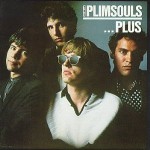
JM: Of course I have to ask you about The Plimsouls. When you started that band, where was your mind at? You’d just been with The Nerves, and you tried with The Breakaways, which it seems didn’t really work out. What were you going for when you started The Plimsouls?
PC: You know, The Nerves was like really stripped-down, really minimal rock ‘n’ roll. I loved what we were doing with The Nerves. It was very teenage, and very stripped-down and minimal rock ‘n’ roll. And then The Breakaways was basically just The Nerves with another guitar player.
The Plimsouls thing – I was injecting another element, there was an injection of soul music and an injection of sort of some folk-rock. I was spreading out the palette, and adding to it. It wasn’t as minimal. It was more of a real full-service rock ‘n’ roll band, The Plimsouls. So that was the vision of it, to make a version of The Nerves that would totally be a full-on rock ‘n’ roll band. We could play everything, all kinds of rock ‘n’ roll. The Nerves was more of a vision of minimal teenage rock ‘n’ roll that we had when we were younger. As I got into The Plimsouls, it was like we were going to be full-service. That’s what it was, and it was pretty successful, too. It was fun.
JM: You guys had a hit with “A Million Miles Away”. How did that song come together?
PC: I wrote it with a couple of guys I’d been writing songs with – Joey Alkes and Chris Fradkin. My fantasy was that I wanted to be like the Brill Building. I admired Barry Mann, Cynthia Weil, Goffin/King, and all that kind of thing. I thought it would be cool to have some guys I wrote with, just sort of a hang-out where you just go write all the time.
So any time I had a day off I’d go over to this apartment where Joey lived, out by a swimming pool. It was really fun, we’d just sit over there – me, him, and Chris – and play guitars. I had a 12-string that I left over there. We’d always be making up songs. It was just sort of a hang – we’d have a few beers and write, that kind of thing. It was really fun.
And then one day, I think actually we went and saw Darby play. I think it was the last Germs gig. Me and Chris Fradkin went to The Starwood and saw that gig. There were kids jumping off the balcony and stuff. Then I went with Chris to a bar, and I sat in that bar. I can’t remember, but I think I wrote the lyrics on a napkin or something. We scoped out the lyrics for the song first, then we went over and Joey was up. We went over to his pad – we had to be quiet because his wife was there – but we started rockin’ and he came up with that hook, and we wrote the whole song over there at Joey’s place in the middle of the night.
We played it the next day at the apartment, and the kids out by the pool all started applauding. It was weird, like we knew we had a good one because people were already cheering for it. So the band went and cut it, and that was a big single, kind of a garage band standard, and a lot of people dig it. That was a pretty big record for us.
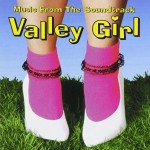
JM: Around that time you guys appeared in the movie Valley Girl. How did that happen, and what was that experience like, being part of a movie like that?
PC: You know, it was kind of just an afternoon’s work, really. Nicolas Cage and the other guy Cameron Dye, they seemed to be fans of the band, and they were coming to our rehearsals when word came up that we might be able to be the band in it. They came out to a couple of rehearsals out in Burbank, and would sit in the room with us while we were rehearsing.
It was after the album – I can’t remember, we were real busy then, always doing this, that, and the other thing. It was just kind of a day’s work. All that stuff, I think, was filmed in one day. We just did it and moved on. I didn’t even really know that the movie was going to be called Valley Girl, or anything. They liked my name “Everywhere at Once”, and they were thinking about calling the movie that at one point. That song’s in the movie, I think.
The oldest story in the world: there were like 2 or 3 songs, and the versions they used in the movie were rough mixes. We hadn’t even really finished the record yet. So they made the movie, but it didn’t come out for a while. By the time the movie came out, our album had already been out and done its thing, but then they came out with that. So it wasn’t really tied in with the promotion of the band, or anything. The movie wasn’t really a big hit until later. It became sort of a classic movie – it got a lot of TV exposure and stuff like that – later, maybe 2 or 3 years later. So the band was already broken up. It wasn’t really like our big claim to fame or anything at the time at all. But then as time went on, it became the way a lot of people view the group – mid-America, you know, knew The Plimsouls from that. So that was cool.
JM: Do you have any new recordings in the works? Are you working on new songs all the time?
PC: Yeah, I’m getting ready to probably make a record in the winter. I’m writing it right now. There’s another record that came out just for the Kickstarter people. I probably will have copies of it at this gig. It’s a record that was done simultaneously with HWY 62. It’s only available at the gig. It’s called Lost Songs and Outside Favorites. It’s a different kind of record for me. So there’s that – that’s the new record I have right now.
Then the 30th anniversary of that other record comes out in September, so I’ll have that record also at the gig. That’s my first solo record on CD with 7 new tracks, and an essay that I wrote about it and a bunch of pictures. Then I’m hoping to have a record ready – it’s going to be a little bit of a departure for me. I don’t really want to go into it, but I’m really excited about it. We’ll be cutting that I think in January or February. It’ll be out next spring or something. That’s all I can say about it. But I’m excited about it. I’ve been writing all the time, and I have a ton of stuff, so we’ll see what happens.
JM: You do get interesting musicians working with you on your records. Anyone planned for the new album?
PC: Yeah, I’ve got some ideas on this new one, and we’ll see how it all pans out. I think it’s going to be pretty cool. It’s going to be a little different. They’re all different – this one will be a little bit different.
I’m really looking forward to the gig up there, though. I enjoy playing in Santa Ynez, so it should be a lot of fun. I’m going out on the road – it’s the start of the tour for the fall. I’ll be on the road pretty much until December. I’ll be going all around the country. But this is at the very beginning of it, and it’s always really fun to play up there for the Tales from the Tavern thing. So I’m really looking forward to it. And I like to talk to audiences. I play songs and I tell stories – it’s the whole thing. I just bring everything I’ve got to it. I really love doing it. Should be a gas! It’ll be a great gig.
JM: I saw you at Sings Like Hell about four years ago, a show with Garland Jeffreys also on the program.
PC: Oh, I remember that. I had a bass player with me.
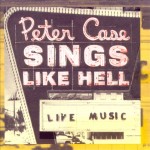
JM: Is it true that Peggie [Jones] got the name Sings Like Hell from your album?
PC: Yeah, that is true. Sings Like Hell #1 I played on. Then I played on #100 – that was the next time they had me back.


Discussion
No comments for “Interview: Peter Case”